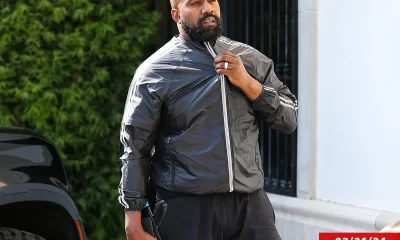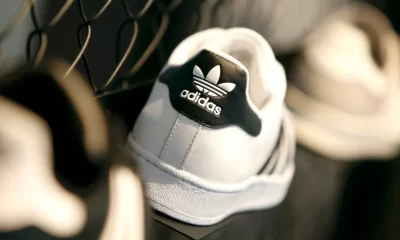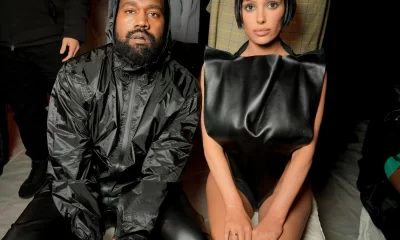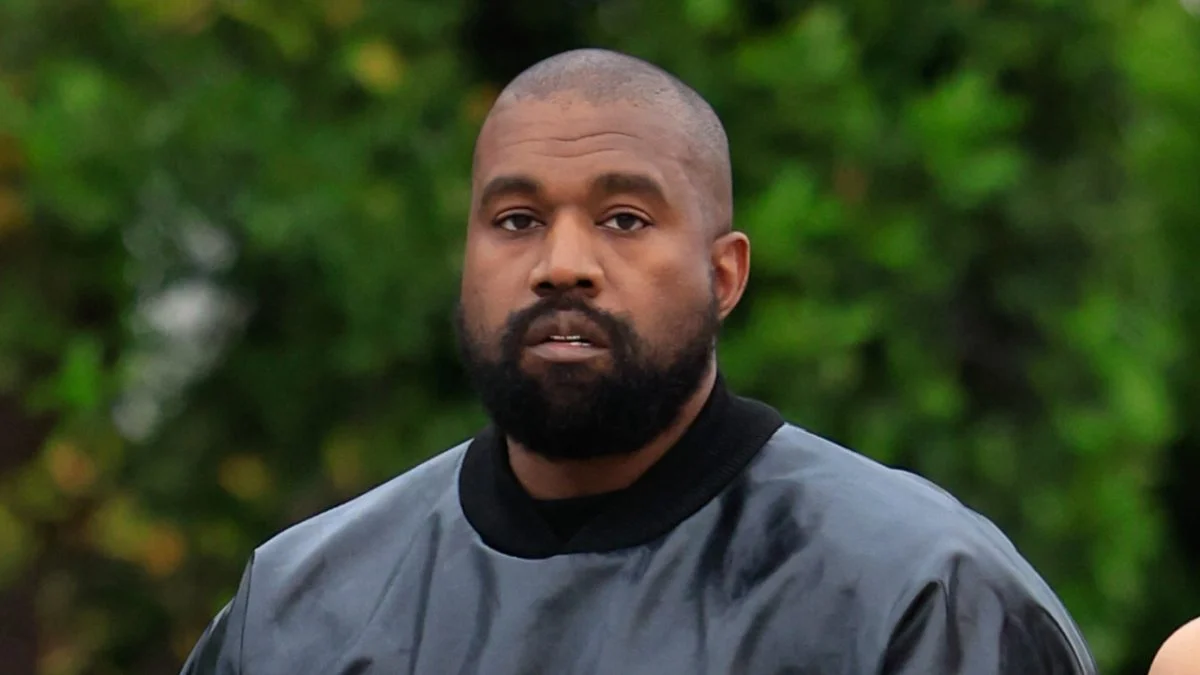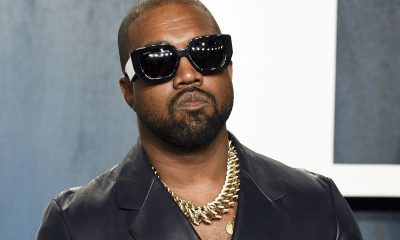ENTERTAINMENT
Kanye West has shown us exactly who he is – and yet the public are still listening

This year, there has been no spectacle in popular culture more grotesque than the unravelling of Ye, the rapper formerly known as Kanye West. But why stop at this year? We have seen other stars make racist statements, experience career-ruining scandals or psychologically disintegrate in public, but to witness all three converge in extremis over two months is unprecedented.
It should spell career suicide. But Ye has ended the year in the top five most-streamed artists of 2022 on Spotify in the UK and the US. His 2021 album Donda is No 43 on Billboard’s chart of the year’s most popular albums. When he isn’t suspended from Twitter, he has 30.6m followers there. As he well knows, media outlets track his every move. People aren’t only still listening; they’re watching, too. Despite being on an apparently terminal course, Ye isn’t about to disappear: this is just the latest chapter in his mission to test the public’s threshold for disgust.
While streaming music may be more passive than buying a record – consumers don’t have to think about where their money is going – as many as 99m of those streams have occurred in the two months since Ye wore a “White Lives Matter” T-shirt at Paris fashion week. He then tweeted that he was “going death con 3 On JEWISH PEOPLE” and made a string of baldly antisemitic remarks, which led to Adidas, Balenciaga, Gap and Def Jam ending enormously lucrative partnerships: farewell billionairedom. Rumours emerged that Ye had long been obsessed with Nazis and almost called his 2018 album Hitler. Far from denying it, he then praised Hitler in interviews, most recently telling the far-right Proud Boys founder Gavin McInnes that Jews should forgive the man behind the Holocaust, and tweeted a Nazi swastika. This was too much even for Twitter owner Elon Musk, who suspended him indefinitely just two weeks after having reinstated him.
His actions also affect US politics. Prominent Jewish conservatives finally turned on Donald Trump after he dined with Ye and Nick Fuentes, a white supremacist and Holocaust denier. Fuentes is an adviser on what Ye imagines to be his 2024 presidential campaign, as, for a moment, was “alt-right” outcast Milo Yiannopoulos. How far gone must you be if you’re making Trump look bad?
Thus the most acclaimed artist of his generation becomes its most prominent bigot. Next year sees the 20th anniversary of Ye’s debut single, Through the Wire. For at least the next decade, there was no more compelling and innovative force in popular music. His doleful, half-sung 2008 album 808s and Heartbreak was initially divisive but ended up changing the sound of hip-hop. So did 2010’s My Beautiful Dark Twisted Fantasy, which was voted album of the decade by Pitchfork readers and Rolling Stone critics. From blurting out “George Bush doesn’t care about Black people” after Hurricane Katrina to his knotty examinations of Black celebrity on 2013’s divisive but gamechanging Yeezus, this son of a literature professor and a Black Panther also had bold, unpolished things to say about race in the US. Even when he appeared to overstep the mark, he was usually vindicated in the end – his widely condemned humiliation of Taylor Swift at the 2009 MTV Video Music awards (VMAs) was reframed as a protest at the lack of industry recognition for Black music, a theme that would define the next decade in pop. Perhaps that led him to believe that would always be the case.

However objectionable his behaviour before 2016, Ye always had two aces up his sleeve. One was self-awareness. Obnoxious men receive immense cultural leeway as long as they wittily acknowledge their obnoxiousness. Whether roasting his ego on Runaway or seeking redemption on Ultralight Beam, Ye sounded as though he understood his flaws. His other great asset was talent – arguably even genius. The combination of the two resulted in overindulgence. Songs such as Blood on the Leaves, which twisted Strange Fruit into a misogynist’s anthem, were praised for their transgressive audacity. And when he joked on Famous about sleeping with Swift, it was Swift who faced a backlash for denying that he had informed her of the lyric in advance. Ye’s moral collapse doesn’t invalidate his past work, but it does colour it, and raise questions about how it was received. As J Wortham, co-host of the New York Times podcast Still Processing remarked recently, “cultural complacency” helped to create “this social monster that we have today”.
Ye’s antisemitism is horrific on its face but it is additionally depressing that someone who has tested the limits of taste in surprising ways has landed somewhere so hatefully banal, no better than a teenage troll on 8chan. Is this really where his career-long quest for personal freedom and authenticity has led him? The turning point came in November 2016, when he was hospitalised with “exhaustion” and made a public appearance at Trump Tower, aligning himself with an overtly racist president-elect. He later visited Trump at the White House, proudly wearing a red Maga cap. James Brown was another ornery, narcissistic Black conservative whose love of money and proximity to power brought him close to a divisive Republican president, but Brown never proceeded to claim that slavery was a choice.
The years since have been chaos. Ye found God (again), embraced gospel, had an eye-wateringly bitter divorce from Kim Kardashian, announced that he was bipolar (a diagnosis he has since rejected and blamed on a Jewish doctor) and ran for president on a platform that sounded a lot like theocracy, receiving 60,000 votes. All the while he moved further to the right, raging against the Democrats and the “liberal media”. It has been easy for previously enthusiastic critics to distance themselves from Ye: he hasn’t released a good album since The Life of Pablo in 2016, so there’s no compulsion to reckon with a record as poisonously brilliant as Yeezus. Yet the likes of Jay-Z, Nicki Minaj and Kid Cudi continued to appear on his records and Netflix released a documentary, primarily covering his early years, called Jeen-Yuhs. Just a few months ago, Ye featured on one of 2022’s biggest songs, Cardi B’s Hot Shit.
That seems unlikely to continue: his previous collaborators, whose ranks include half of pop music, will be justly condemned if they work with him again. (His longtime engineer Andrew Dawson has pledged to donate royalties to organisations including the ADL and NAACP.) The velocity of Ye’s recent implosion has demolished the old excuses anyone could make for him. Mental illness? His bipolar disorder has been well-documented but his journey to the far right has been remarkably consistent. If his views are more moderate between manic episodes, then we never get to hear them. The trauma of losing his beloved mother Donda? That was 15 years ago. The double standards applied to Black superstars? He’s beyond those. If Taylor Swift were to praise Hitler, she’d have a pretty thin time of it, too. Blame his enablers? Numerous friends and collaborators have urged him to seek help, or severed ties, but he can always hire more yes men. It is unrealistic and infantilising to expect anybody to rein him in.
It is debatable how much Ye has really changed when his recent behaviour is driven by the same qualities that once made him great: a devout conviction in his own ideas, bravado, a refusal to apologise or heed advice. In Ye’s recent interviews, he is increasingly incoherent but you can still see that same old tense smile, the same erratic grandiloquence, the same yeah-I-went-there provocations: the man telling Alex Jones about his admiration for Hitler is the same man who, nine years ago, told Zane Lowe he believed he was a god. All his defining qualities have turned foul.
Traditionally a scandal-hit celebrity will issue an apology or fall silent for a while, as Ye did after the VMAs, but as it stands, he keeps digging a hole, one now so deep it resembles an abyss. Watching his recent interviews, you can see the rightwing podcaster Tim Pool and Infowars’ Alex Jones begging him to play the game and use one of the standard far right dog whistles but Ye insists on saying the quiet part out loud. The House Judiciary GOP finally deleted the trollish tweet reading “Kanye. Elon. Trump.” that it had posted after the “White Lives Matter” incident. Apparently there is a line after all, and it has Hitler’s name written on it.
Where does a far-right rap star go from here? As Michael Jackson demonstrates, a sufficiently beloved back catalogue can withstand considerable scandal but Ye is still alive and only 45 years old. As the trickle of allegations about sexual harassment and bullying at Adidas becomes a flood, his fashion career appears dead, although brands and record labels will continue to make money from his earlier work. He could probably still sell out arenas but who would want to risk encountering an antisemitic diatribe between the hits? Ye appears fully committed to making it impossible to separate the art from the artist: his new song Someday We’ll All Be Free, which samples both Donny Hathaway and the Alex Jones interview, is like an obscene parody of everything he used to be.
Streaming stats aside, whether there might be a way back to the centre of the culture for Ye if he actively sought one is irrelevant. So is the riddle of what he is thinking and what he hopes to achieve. It doesn’t matter. When somebody talks like a neo-Nazi, it is reasonable to take him at his word and let him face the consequences.
[via]


